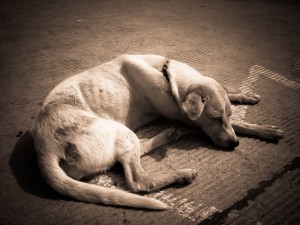(a lot) more people than you may think
[phrase]
[je zal ze de kost moe-ten ge-ven] ![]()
 The noun ‘kost’ is the singular form of ‘kosten’: costs, expenses. In this meaning, the plural form is most common. The singular form ‘kost’ however is more commonly used in the meaning of ‘food’ (that you need on a daily basis). One may ask you for example (informally): ‘Wat doe jij voor de kost?’ (‘What do you do for a living?’).
The noun ‘kost’ is the singular form of ‘kosten’: costs, expenses. In this meaning, the plural form is most common. The singular form ‘kost’ however is more commonly used in the meaning of ‘food’ (that you need on a daily basis). One may ask you for example (informally): ‘Wat doe jij voor de kost?’ (‘What do you do for a living?’).
The expression ‘Je zal ze de kost moeten geven’ translates as: ‘Imagine (/what if) you would have to feed them (on a daily basis)!’, and is used to say that one must not underestimate the number of people who (would) do a particular thing. In other words: ‘A lot more people than you may think!’.
You may also encounter this expression in the form ‘Ik zou ze niet graag de kost willen geven.’ Both examples are often followed by a sentence of the form: ‘…die […]’, see the Examples below.
Examples:
– “Je zal ze de kost moeten geven die vergeten uit te checken bij het verlaten van de tram!”
(“A lot more people than you may think forget to check out when exiting the tram.” This example refers to the use of the ‘OV-chipcard’ in Dutch public transport.)
– “Wordt er echt zo veel gestolen op het werk?” – “Wat dacht je! Je zal ze de kost moeten geven die pennen of een pak papier mee naar huis nemen!”
(“Is stealing at the work floor really common practice?”- “You bet! Don’t underestimate the number of people who take pens or (a pack of) paper home!” Literally: “Is there really that much stealing at work?”)
– “Ik zou ze niet graag de kost willen geven die hun goede voornemens voor het nieuwe jaar al na een week op de lange baan schuiven.”
(“There are really a lot of people who, already after one week (into the new year), postpone (and potentially cancel) their New Year’s resolutions.” Note the expression ‘Iets op de lange baan schuiven’: to postpone (for an implied longer period of time), often leading to cancellation of the plans.)
– “Ik vind het ongelofelijk hoeveel mensen links blijven rijden op de snelweg.” – “Nou, je zal ze de kost moeten geven!”
(“I think it’s incredible how many people keep left on the highway/motorway.” – “Exactly, a lot of people…” In the Netherlands the rule is that one should keep right so that others can overtake; overtaking on the right is not allowed.)
Related words:
– Kost: cost/expense, or ‘daily portion of food’ [noun] [de kost, plural ‘kosten’ only for ‘cost’].
– Eten: common noun for ‘food’ in daily and social context [noun] [het eten, <no plural>].
– Voedsel: synonym for ‘eten’, however used for ‘anything edible in general’ [noun] [het voedsel, <no plural>].
– Mensen: people [noun] [de mensen]. Dutch noun for ‘a people’ is ‘volk’.
– Veel: many/much [adjective].
Things to remember from this DWOTD
– ‘Kost’ in the meaning of ‘cost/expense’ is mostly used in the plural form ‘kosten’. There are many expressions in which ‘kost’ means ‘(daily portion of) food’;
– Difference between ‘eten’ and ‘voedsel’;
– Meaning of the phrase ‘Wat doe jij voor de kost?’.
– Meaning of the expression ‘Iets op de lange baan schuiven’.

 The literal translation of ‘rooskleurig’ is ‘rose-coloured’. Perhaps because there is no unique colour for roses, one encounters ‘rooskleurig’ more often in the figurative meaning of ‘reflecting optimism’, e.g. ‘een rooskleurige toekomst’: a bright future.
The literal translation of ‘rooskleurig’ is ‘rose-coloured’. Perhaps because there is no unique colour for roses, one encounters ‘rooskleurig’ more often in the figurative meaning of ‘reflecting optimism’, e.g. ‘een rooskleurige toekomst’: a bright future. Literally ‘vel over been’ translates as ‘skin over bone’. It applies to situations where people or animals are dying of hunger and literally only have skin left. However, it can also be used to say that somebody is very very skinny, or scrawny, basically emphasizing how skinny the person is.
Literally ‘vel over been’ translates as ‘skin over bone’. It applies to situations where people or animals are dying of hunger and literally only have skin left. However, it can also be used to say that somebody is very very skinny, or scrawny, basically emphasizing how skinny the person is. Hallo allemaal!
Hallo allemaal!